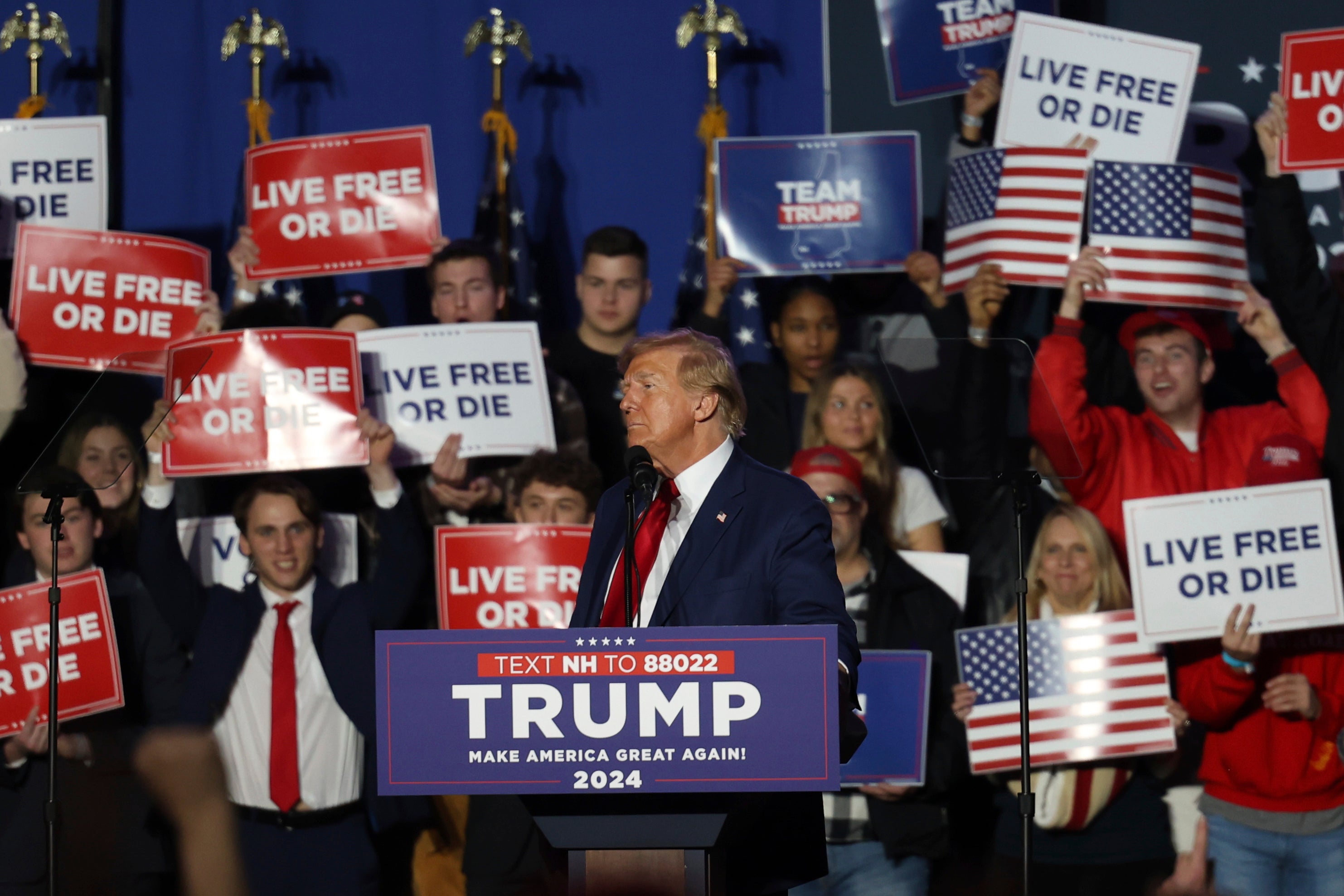Where was Donald Trump facing attempts to remove him from the ballot?
Formal challenges to ex-president’s candidacy were filed in at least 35 states before the Supreme Court intervened
Your support helps us to tell the story
From reproductive rights to climate change to Big Tech, The Independent is on the ground when the story is developing. Whether it's investigating the financials of Elon Musk's pro-Trump PAC or producing our latest documentary, 'The A Word', which shines a light on the American women fighting for reproductive rights, we know how important it is to parse out the facts from the messaging.
At such a critical moment in US history, we need reporters on the ground. Your donation allows us to keep sending journalists to speak to both sides of the story.
The Independent is trusted by Americans across the entire political spectrum. And unlike many other quality news outlets, we choose not to lock Americans out of our reporting and analysis with paywalls. We believe quality journalism should be available to everyone, paid for by those who can afford it.
Your support makes all the difference.In several states, voters and organisations filed lawsuits challenging Donald Trump’s eligibility to appear on the 2024 presidential primary ballots by invoking Section Three of the 14th Amendment – known as the insurrection clause.
Section Three of the amendment prohibits those who take part in rebellion or aid enemies of the US government from taking office.
The lawsuits cited Mr Trump’s involvement in the January 6 attack on the US Capitol as cause for violating the provision and thus grounds for disqualification.
Up until Monday, March 4th, challenges were filed in at least 35 states with Colorado, Maine and Illinois moving to remove Mr Trump from the primary ballots.
However, on March 4th the US Supreme Court intervened in the challenges, saying that only Congress had the authority to remove candidates from ballots under the provision. The decision ended the ongoing challenges Mr Trump faced in several states.
Here’s a look at some of the challenges to Mr Trump’s eligibility for the 2024 race:
Michigan
After a lawsuit was filed to remove Mr Trump from the race in Michigan, a state court judge ruled in November that Mr Trump could appear on the ballot.
The judge said that neither courts nor the Michigan Secretary of State had the authority to determine when someone is eligible to run for office.
The judge claimed Section Three of the 14th Amendment was a “political question” which is non-justiciable.
Free Speech For the People, a liberal group representing voters, appealed the decision but the state’s appeals court upheld the lower court’s decision.
The Michigan Supreme Court chose not to take up the case.
Minnesota
The Minnesota Supreme Court dismissed a lawsuit seeking to remove Mr Trump from the ballot in November.
After hearing oral arguments in the case, the justices said that neither election officials nor the court had the authority to stop the Republican Party from making Mr Trump the party’s official nominee.
However, plaintiffs could re-challenge Mr Trump’s ability to appear on the general election ballot.
Oregon
Oregon Secretary of State LaVonne Griffin-Valade has said she would keep Mr Trump’s name on the primary ballot, citing her lack of authority to determine the qualifications of candidates.
At the beginning of December, Oregon voters and the organisation Free Speech for People filed a petition to the state’s Supreme Court challenging Mr Trump’s eligibility under the 14th Amendment.
The Oregon Supreme Court rejected that challenge, saying it would wait to hear the US Supreme Court rule on the Colorado case.
Arizona
A federal judge dismissed a lawsuit brought by John Anthony Castro, an individual running as a 2024 Republican presidential candidate, claiming that Mr Castro did not have the standing to challenge Mr Trump’s eligibility.
Mr Castro, who has little campaign presence or financial contributions, claimed he was suffering a competitive injury against Mr Trump who should be disqualified under the 14th Amendment.

But a federal judge said Mr Castro was not legitimately competing with Mr Trump.
Other lawsuits brought forth by Mr Castro in New Hampshire, Rhode Island, Florida, California, Montana, Idaho, Kansas, Alaska, Oklahoma, Connecticut, Massachusetts, Utah and North Carolina were also dismissed.
In Arizona, some of the filings in the appeal in the US Court of Appeals for the Ninth Circuit are due next month.
Colorado
The Colorado Supreme Court declared the former president ineligible to appear on its presidential primary ballot on December 19 due to his involvement in the January 6 attack on the Capitol.
The state became the first to issue the historic ruling.
“We do not reach these conclusions lightly,” the order from the court’s majority said. “We are mindful of the magnitude and weight of the questions now before us,” the justices wrote. “We are likewise mindful of our solemn duty to apply the law, without fear or favor, and without being swayed by public reaction to the decisions that the law mandates we reach.”
Mr Trump appealed the decision and it made its way to the US Supreme Court which said the state erred in its decision.
Maine
Maine Secretary of State Shenna Bellows declared Mr Trump ineligible to appear on the state’s presidential primary ballot in a ruling issued on Thursday, December 28.
Ms Bellows said that the former president contributed to riots at the Capitol by spreading false claims of election fraud and then directing supporters there when Congress was set to certify the 2020 election results.
She said Mr Trump was “aware of the likelihood for violence“ and “at least initially supported its use given he both encouraged it with incendiary rhetoric and took no timely action to stop it.”
“The weight of the evidence makes clear that Mr Trump was aware of the tinder laid by his multi-month effort to delegitimise a democratic election, and then chose to light a match,” she wrote.

The ruling arrives after Ms Bellows held a hearing to evaluate three separate complaints, brought by former Maine politicians and residents, regarding Mr Trump’s eligibility as well as invited the parties to file briefs regarding the matter.
A state judge ordered the secretary of state to come back to the matter following the US Supreme Court ruling on the Colorado appeal.
Illinois
After the Illinois State Board of Elections declined to intervene in a challenge to Mr Trump’s eligibility, a District Court Judge weighed in and decided the former president was ineligible under the 14th Amendment.
However, Judge Tracie Porter put her decision on pause until the US Supreme Court could rule on the matter.
New Jersey
A resident of New Jersey filed a complaint to a state superior court claiming Mr Trump is ineligible under the 14th Amendment.
The attorney general of the state asked the court to dismiss the case citing its lack of ripeness and jurisdiction.
New York
A New York Republican and attorney have filed a lawsuit in district court asking that neither Mr Trump nor any of his 18 co-defendants in the Georgia election interference case, be permitted to participate or hold office in New York.
Virginia
In a Richmond State Circuit Court, a lawsuit remains pending. A lawsuit filed in federal court has been dismissed.
Wyoming
A Wyoming resident filed a lawsuit in a state district court in November seeking to remove Mr Trump as well as Senator Cynthia Lummis from appearing on the 2024 primary ballot.
The lawsuit was dismissed in State District Court in Albany County but the plaintiff filed a notice of appeal to the state Supreme Court.
Other challenges
Mr Trump has also faced challenges to his eligibility in Alaska, California, Connecticut, Delaware, Florida, Idaho, Kansas, Louisiana, Massachusetts, Montana, Nevada, New Hampshire, New Mexico, North Carolina, Oklahoma, Pennsylvania, Rhode Island, South Carolina, Texas, Utah, Vermont, Washington, West Virginia, and Wisconsin.

Join our commenting forum
Join thought-provoking conversations, follow other Independent readers and see their replies
Comments